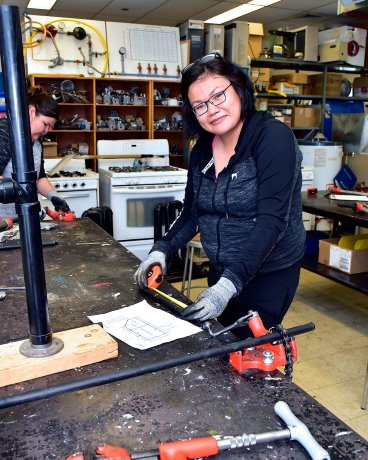Canadore College has a new program that is opening doors for aboriginal women in the trades.
The 12-week program at the North Bay, Ont. college has seen 15 First Nations women enrolled in the first intake and a 100 per cent graduation rate.
"The program is designed to bring female students (on) who have never had previous experience in a trades program — getting them the skills in a variety of the trades, getting them skills in English and math and teaching them confidence and mentorship along the way, so that they can either gain some entry level work in communities or then transition on into another post-secondary program at the college or at another college," said Shawn Chorney, vice-president of enrolment management, indigenous and student services at Canadore.
Aside from providing trades training, the program teaches women the skills they need to find work in their communities and provides an opportunity for them to pursue further studies, such as a diploma or certificate program. The program has practical and placement components as well.
"The students learn about contemporary issues that are happening in the world around us. They learn about a variety of different trades including welding, plumbing, electrical and carpentry. They get intensive, hands-on training in those areas so they know how to cut pipe and glue it together and how to wire plugs and switches," said Chorney. "They’ve got a pretty diverse entry-level set of skills at the end of the program."
Tuition was fully funded through the Province of Ontario’s Local Poverty Reduction Fund. The college applied for funding about 18 months ago and received a two-year grant which covers tuition, instruction and the cost of materials.
"We wanted to launch a new program here at the college that could draw some students into non-traditional areas of study to help them participate in the workforces in their communities as well as to help break the cycles of poverty and dependency," Chorney stated. "We started to talk to some of our partners and we had a look at areas in communities that are growing, plus areas that have underrepresented workforce participation by groups. With that, we started to have a look at the potential to launch a women in trades program for indigenous women."
Students enrolled in the program are also learning soft skills outside of the formal curriculum. They’re provided with a program co-ordinator, or a mentor, who helps them navigate life skills, build confidence in their abilities to interview and find support and care for their families, explained Chorney.
"We did that on purpose because we need to infuse skills that will allow them to thrive not only once they have a job but to be able to balance work, life, children and all of those things," said Chorney, adding the elder in residence also provides support for students, especially those coming from distant communities who are adjusting to student life.
Students who return to their communities can find work with contractors, home renovators or work for themselves.
Chorney added transition supports are in place to assist students with either moving to a job within their community or going into a post-secondary program.
"It allows people to get out of the cycles of dependency, whether its Ontario Works or other government funding or just living in poverty, and it helps raise their families up as participating members of their community," he said. "It provides the confidence and some of the academic rounding and background to go into a full-time post-secondary trades program. We’ve had a number of students do that and that wasn’t an option when they started. Without this they wouldn’t have had the confidence or skills or background to do it, so opening up access is a major component."
Although it has improved, women are still underrepresented in the trades, Chorney pointed out.
"A lot of employers articulate to our college through our employer services office that they want a balanced workforce," said Chorney "Through this project, we were able to help match some people with jobs and help match some people with employers that were highly underrepresented."
The program is expected to run for a second time this year. The second intake will begin in March and run throughout the summer.
"After one intake we’re very pleased with the results," said Chorney. "We’ve exceeded all of our targets, the participants are pleased, we saw the transformative ability of the program to bring people from where they were to where they want to go. Our goal coming through the next intake is to secure additional funding and to work with our partners on continuing to find the resources to support it.
"I think we’ll be able to work with community partners and with the college to keep it going because we see that it’s made a big impact already."




Recent Comments
comments for this post are closed